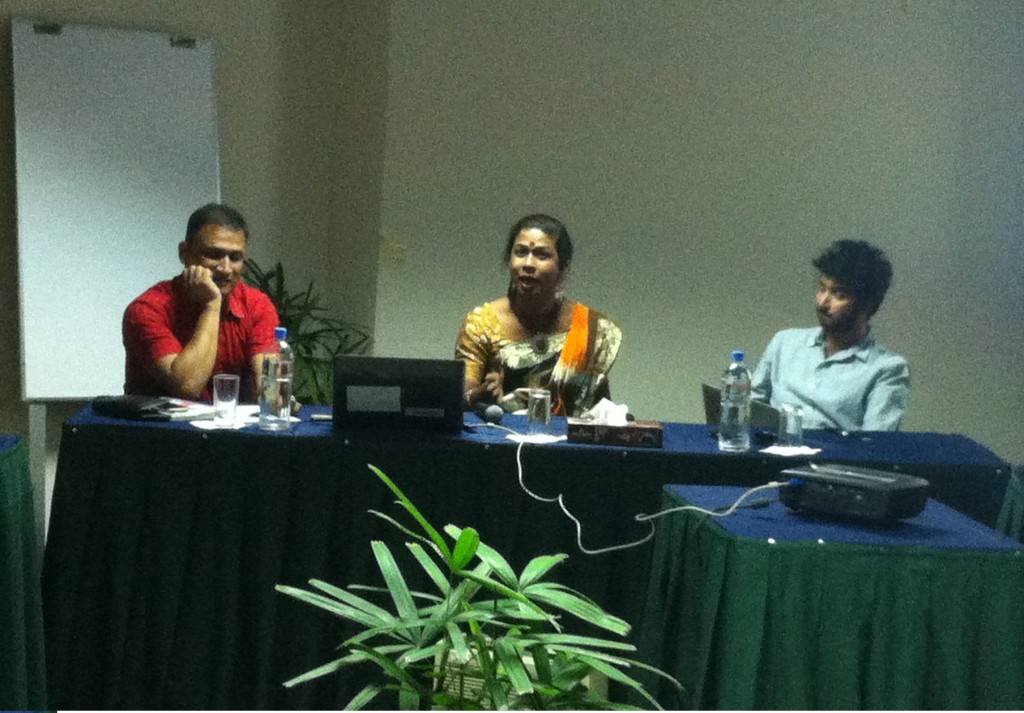By Anjali Sarker

In 2012, the BRAC Social Innovation Lab launched its first idea box, a simple way to source ideas from the field staff. Currently there are idea boxes in twenty-two out of twenty-seven BRAC Learning Centres (BLCs) and also another one at the head office. These boxes serve as an alternative communication channel for the staff to share their ideas and thoughts with the senior management. Recently Abul Monsur, who is based in Chittagong, and works with the BRAC Learning Division, suggested arranging vocational training for hijras so that they can engage in income-generating activities and gain economic freedom. This idea was discussed in the Inter Programme Coordination (IPC) meeting with programme heads and coordinators last month.
The Social Innovation Lab invited Shale Ahmed, the founder and CEO of Bandhu Social Welfare Society and Ananya, a representative from the hijra community, to speak at our October innovation forum. Saad Khan, a researcher at BRAC University’s Institute of Educational Development, moderated the session. The slides from Mr. Ahmed’s presentation can be found here.
According to the Ministry of Social Welfare, there are about ten thousand hijras in Bangladesh. Though human rights organizations claim the real number is much higher. Bandhu Social Welfare Society is one of the few organizations in Bangladesh that works to improve the well-being of sexual minorities by offering sexual and reproductive health services and supporting their rights. Founded in 1996 as a small organization to address human rights abuse and denial of sexual health rights, it has become a community-led, national level organization that is currently providing social and health services to a broad range of sexual minority populations in 21 districts in Bangladesh.
Mr. Ahmed kicked off the session by sharing his experience of working with sexual minorities and said that the discrimination towards this population begins with their family and affects every aspect of their lives. Shedding light on the real situation of sexual minorities in Bangladesh, he pointed out that we often get confused about the terms describing sexual minorities. Traditionally the gender norms are very strongly perceived and followed in Bangladesh society, so when sexual minorities do not behave in the way that they are expected to behave, they become isolated and a lifetime of discrimination commences.
Quoting examples from other South Asian countries, Mr. Ahmed said that the legal advocacy to ensure hijras get their rights is quite strong in India, and Nepal has made remarkable strides. In fact, Nepal is the first country in the world to include a third gender option on its census forms, following a Supreme Court decision ruling against gender identity discrimination in 2007. Though the government of Bangladesh granted “third gender” status to hijras last year, they are still subjected to a high degree of violence and extrajudicial violation of their rights. Even their own family members are ashamed of them and very often they do not receive a fair share of their inheritance. In short, hijras rights exist on paper only, not in practice.
According to Mr. Ahmed, the discriminatory status of hijras in the society is often influenced by the social class structure. Hijras who belong to a higher social-economic class and get access to good education and other resources do not face as much discrimination. Unfortunately there are not enough interventions targeted towards sexual minorities in Bangladesh. The few that exist focus on offering basic sexual health services. However, more pressing issues like training them to become economically self-sufficient, offering counselling services, and providing mental health support are largely ignored.
Ms. Ananya echoed his comments and added that many people assume that all hijras are sex workers but they don’t think about what they have to go through. Most of them drop out from school after being bullied and harassed. Without education and support from their families, it becomes nearly impossible to get jobs and therefore, they have no other way to support themselves except through begging and prostitution.
On November 10, 2014 the first ever Hijra Pride Parade was held in Dhaka, marking one year of their recognition as a third gender in Bangladesh. While the colourful banners read slogans of hope, like “The days of stigma, discrimination and fear are over”, there is no doubt that we still have a long way to go before we have a society that does not discriminate against sexual minorities.
Anjali Sarker is an officer with the BRAC Social Innovation Lab.